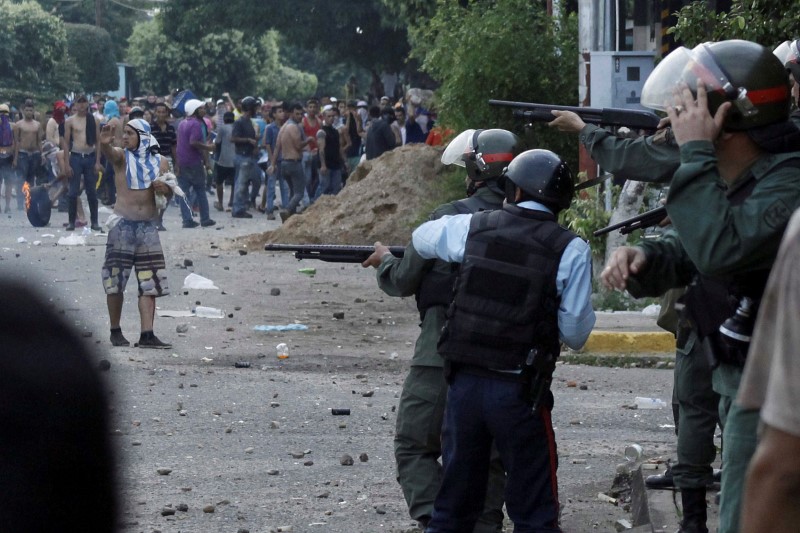
By Brian Ellsworth
CARACAS (Reuters) – Protesters blocked a highway in Venezuela’s capital Caracas for nearly eight hours this week in an effort to show the opposition’s dedication to civil disobedience as their main tool to resist President Nicolas Maduro.
But by the end of the afternoon, hooded youths had filled the highway with burning debris, looted a government storage site, torched two trucks and stolen medical equipment from an ambulance.
“This is no peaceful protest, they’re damaging something that belongs to the state and could be used to help one of their own family members,” said Wilbani Leon, head of a paramedic team that services Caracas highways, showing the damage to the ambulance.
Anti-government demonstrations entering their fourth week are being marred by street violence despite condemnation by opposition leaders and clear instructions that the protests should be peaceful.
Such daytime violence also increasingly presages late-night looting of businesses in working-class areas of Caracas, a sign that political protests could extend into broad disruptions of public order driven by growing hunger.
The opposition’s so-far unsuccessful struggle to contain its violent factions has helped Maduro depict it as a group of thugs plotting to overthrow him the way opposition leaders briefly ousted late socialist leader Hugo Chavez in 2002.
CIVIL DISOBEDIENCE, VIOLENT PROTEST
The unrest has killed at least 29 people so far and was triggered by a Supreme Court decision in March to briefly assume powers of the opposition Congress. Maduro’s opponents say the former bus driver and union leader who took office four years ago has turned into a dictator.
The vast majority of demonstrators shun the violence that usually starts when marches are winding down or after security forces break up protests.
That gives way to small groups of protesters, many with faces covered, who set fire to trash and rip gates off private establishments or drag sheet metal from construction sites to build barricades.
They clash with security forces in confused melees. Police and troops break up the demonstrations by firing copious amounts of tear gas that often floods nearby apartment buildings and in some cases health clinics.
The opposition has blamed the disturbances on infiltrators planted by the ruling Socialist Party to delegitimize protests, which demand Maduro hold delayed elections and respect the autonomy of the opposition-run Congress.
But even before rallies devolve into street violence, tensions frequently surface between demonstrators seeking peaceful civil disobedience and those looking for confrontation – some of whom are ordinary Venezuelans angry over chronic product shortages and triple-digit inflation.
“If we just ask him ‘Mr. President, would you be so kind as to leave?’ he’s not going to leave,” said Hugo Nino, 38, who use to work at a bakery but lost his job after Maduro passed a resolution boosting state control over bread production.
“Resistance, protesting with anger, that’s how we have to do it,” he said.
He and some others at the Caracas highway sit-in on Monday morning bristled at opposition leaders’ calls for non-violence.
An unrelated group of people collected tree trunks and metal debris to barricade the road. They covered one section with oil, making it dangerous for police motorcycles to cross it.
TRUCKS ON FIRE
By 4 p.m., opposition legislators had started walking through the crowd with megaphones, asking that people leave the protest as had been planned.
The thinning crowd remained calm until a tear gas canister was heard being fired in the distance. Demonstrators reacted by banging on a metal highway barrier with pipes and rocks.
A small group then broke into a government compound that houses cargo trucks and highway-repair materials, and made off with cables, pipes and wooden pallets and other materials for barricades.
The team of paramedics that works in the unguarded compound did nothing to stop them, out of what they said was concern for their personal safety. They did halt two youths trying to steal a car with an eye toward setting it alight.
The demonstrators later set fire to two cargo trucks.
One teenager, stripped from the waist up and with a t-shirt covering his face, urged nearby reporters to take pictures of the blaze but drew the line at appearing himself.
“Delete that video,” he said, pointing to a Reuters reporter filming him.
(Reporting by Brian Ellsworth; Editing by Alexandra Ulmer; Christian Plumb and Andrew Hay)







